‘Swiss Schindler’ honoured with room in Federal Palace

A key meeting venue in the Swiss Federal Palace in Bern was on Monday renamed the ‘Carl Lutz room’ in honour of the diplomat who – together with his colleagues in Budapest – saved tens of thousands of Jews in Hungary from the Nazis in the Second World War.
The room in the West Wing of the building is where high-level foreign policy decisions are forged, the Federal Department of Foreign Affairs said in a media release on Monday.
The meeting room received its new name on the 43rd anniversary of the death of Carl Lutz. A commemorative plaque bearing his name and those of Harald Feller, Gertrud Lutz-Fankhauser, Ernst Vonrufs and Peter Zürcher – all of whom worked with Lutz to help save the lives of over 60,000 Jews from Nazi extermination camps – was also placed in the room.
Lutz has been described as the ‘Swiss Oskar Schindler’ – a reference to the German industrialist whose role in saving over a 1,000 Jews was made famous by the Steven Spielberg film Schinder’s List.
From 1942 to 1945, Lutz worked as vice-consul for neutral Switzerland in Budapest. When the Germans occupied the country in 1944, the diplomat managed to hammer out an agreement for the Germans to provide safe passage for 8,000 Jews. He then applied the diplomatic letters of protection he obtained to whole families instead of individuals. When the 8,000 documents were used up, he simply began the numbering series again.
Lutz and his colleagues also set up safe houses around the Hungarian capital where thousands of Jews took shelter.
An estimated 62,000 Jews are thought to have been saved by these efforts.
The belated recognition of the efforts of Lutz on the part of Swiss authorities mirrors the story of Swiss policeman Paul Grüninger.
In 1938, Switzerland rolled out tough new immigration laws prohibiting the entry of Jewish refugees. But Grüninger defied orders by granting refugee status to between 2,000 and 3,000 Jews. He did this by backdating documents to the period when Jews could still enter Switzerland.
He was tried in 1940 and dishonourably discharged from the police. It was not until the late 1990s that a court in St Gallen finally cleared his name while the cantonal police force did not honour his achievement until 1914.
Both Grüninger and Lutz have been honoured by Israel with the title Righteous Among the Nations, awarded to non-Jews who strove to save Jewish lives during the Second World War.
Comments
See Also
The room in the West Wing of the building is where high-level foreign policy decisions are forged, the Federal Department of Foreign Affairs said in a media release on Monday.
The meeting room received its new name on the 43rd anniversary of the death of Carl Lutz. A commemorative plaque bearing his name and those of Harald Feller, Gertrud Lutz-Fankhauser, Ernst Vonrufs and Peter Zürcher – all of whom worked with Lutz to help save the lives of over 60,000 Jews from Nazi extermination camps – was also placed in the room.
Lutz has been described as the ‘Swiss Oskar Schindler’ – a reference to the German industrialist whose role in saving over a 1,000 Jews was made famous by the Steven Spielberg film Schinder’s List.
From 1942 to 1945, Lutz worked as vice-consul for neutral Switzerland in Budapest. When the Germans occupied the country in 1944, the diplomat managed to hammer out an agreement for the Germans to provide safe passage for 8,000 Jews. He then applied the diplomatic letters of protection he obtained to whole families instead of individuals. When the 8,000 documents were used up, he simply began the numbering series again.
Lutz and his colleagues also set up safe houses around the Hungarian capital where thousands of Jews took shelter.
An estimated 62,000 Jews are thought to have been saved by these efforts.
The belated recognition of the efforts of Lutz on the part of Swiss authorities mirrors the story of Swiss policeman Paul Grüninger.
In 1938, Switzerland rolled out tough new immigration laws prohibiting the entry of Jewish refugees. But Grüninger defied orders by granting refugee status to between 2,000 and 3,000 Jews. He did this by backdating documents to the period when Jews could still enter Switzerland.
He was tried in 1940 and dishonourably discharged from the police. It was not until the late 1990s that a court in St Gallen finally cleared his name while the cantonal police force did not honour his achievement until 1914.
Both Grüninger and Lutz have been honoured by Israel with the title Righteous Among the Nations, awarded to non-Jews who strove to save Jewish lives during the Second World War.
Join the conversation in our comments section below. Share your own views and experience and if you have a question or suggestion for our journalists then email us at [email protected].
Please keep comments civil, constructive and on topic – and make sure to read our terms of use before getting involved.
Please log in here to leave a comment.